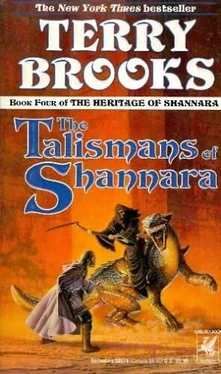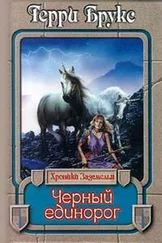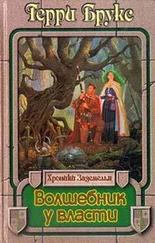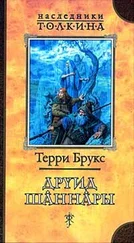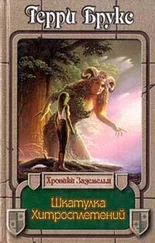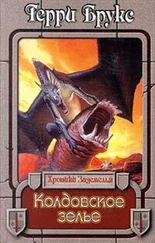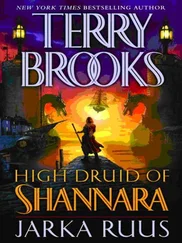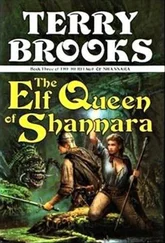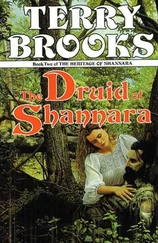Par had already decided that use of the wishsong in this endeavor was a foregone conclusion, so he was quick to give Padishar his promise. What he could not promise—and what he did not tell the other—was that he was no longer certain he could control the magic. It had already proved unreliable, already shown that it could take on a life of its own, unleashing power that might well consume him. But such fears as recognition of this danger generated paled against his feelings for Damson Rhee. Buried by the struggle they had shared to escape the city and its hunters, and by the fact that he had felt her safe with him, his feelings had surfaced instantly with the report of her taking, and now they raged within him like a fire unchecked. He loved her. Perhaps he had loved her from the first, but certainly since she had held him together after Coll’s death. She was as much a part of him as anything separate could possibly be, and he could not stand the thought of losing her. He would give anything to see her safe again. He would give everything. If it meant risking the fury of a magic that could change him irrevocably, that could even destroy him, then so be it. If Rimmer Dall was right about who and what he was, then there was nothing he could do to save himself in any case. He would not shy from the dangers of the magic where Damson’s safety was at stake. He would do what he must.
So they had set out, each determined that Damson was worth losing everything, knowing the risk was such that everything could well be lost. Now the sewers stretched away in narrow, winding tunnels before them, the darkness closing fast about the little light that remained. Soon they would be forced to use torchlight to see, and that would be especially dangerous as they neared the city’s walls. For there the dark things would likely be at watch below ground as well as above, and torchlight would be seen coming from a long way off.
They hurried on, the Mole’s sharp eyes and steady senses choosing their way unerringly, sorting out which paths were safe, avoiding the ones that might impede them. As they went, they could hear the sounds of the city above drifting down in trickles and snatches, bits and pieces of a life as disconnected from their own as the living from the dead. Par’s thoughts drifted. It felt somehow as if they were entombed within the stone of the bluff on which Tyrsis had been built, specters at haunt just out of sight of the people they had once been. It seemed to the Valeman, on reflection, that he was indeed more ghost than human, that in his flight from the Shadowen and the other dangers encountered on this journey he had become transformed in a way that he did not entirely understand and as a result had been stripped of substance and left ethereal. He moved now in a shadow existence, increasingly bereft of friends and family, left trapped in a tangle of magics that were causing him to disintegrate. There should have been a way to save himself, he knew, but somehow he could not seem to discover what it was.
They reached a broad confluence of pipes and slowed behind the Mole’s cautious signal. Huddled close at the bottom of a well from which a stone stairway climbed, they held their last council.
“The stairway leads to a cellar within the inner wall,” whispered the Mole. His nose was damp and gleaming. “From there we must climb to a hall, follow it to an entryway that leads outside again, cross to another door, enter, and follow a second hall to a hidden passageway that will take us up through the watchtower to where Damson waits.”
He looked from Padishar to Par and back again, intent.
The big man nodded. “Federation guards?”
The Mole blinked. “Everywhere.”
“Shadowen?”
“In the tower, somewhere.”
Padishar gave Par a wry smile. “Somewhere. Very incisive.” He hunched his big shoulders. “All right. Remember what I said, the both of you. Remember what you are to do—and not to do.” He glanced at Par. “If I fall, you go on—if you can. If not, get to Firerim Reach and find help there. Promise me.”
Par nodded, thinking as he did that the promise was a lie, that he would never turn back, not until Damson was safe, no matter what.
Padishar reached back over his shoulder and tightened the straps that secured the broadsword to his back, then checked the long knives and short sword strapped about his waist. The handle of yet another long knife protruded from one boot. All were carefully sheathed and wrapped in cloth to keep the metal from rattling or reflecting light. Par wore only the Sword of Shannara. The Mole carried no weapons at all.
Padishar looked up again. “All right, then. Let’s go in.”
In single file they climbed the stairs, crouching low against the stone, easing their way toward the faint light that shone above. A grate came into view, bars of iron that cast a web of shadows down the steps and onto their bodies. There was silence above, an empty, hollow nothingness.
On reaching the grate, the Mole paused to listen, his head cocked in the manner of an animal at hunt—or at risk—then reached up and with surprising strength lifted the grate away almost soundlessly. Stepping from the well, he carried the grate overhead as the other two climbed swiftly free, then set it carefully back in place.
They stood in a cellar that was one in a series of interconnected rooms, all in a line that ran away to either side as far as the eye could see. Stores were stacked everywhere, crates of weapons, tools, clothes, and sundry goods, all carefully labeled and piled back against the thick stone walls on wooden pallets. Barrels were housed in an adjoining chamber, and barely visible through the gloom the rusting frames of old beds formed a maze of metal bones. High on the walls, just below the cellar ceiling and just above the ground without, a row of narrow, barred windows let in thin streamers of dusk’s fading light.
The Mole took them ahead through the maze of cellar rooms, past the stacks of stores, and around the tangle of crates to where a second set of stairs climbed to a heavy wooden door. They went up the stairs cautiously, and Par felt the hairs on the back of his neck prickle with the possibility that unseen eyes watched their every move. He peered left and right, overhead and all about, but saw nothing.
At the door they stopped again while the Mole used a small metal implement to spring the lock. In seconds they were through, moving swiftly into the hallway beyond. They were inside the citadel’s inner wall now, the second line of defense to the city and the location of the barracks that housed most of the Federation garrison. The corridor was straight and narrow, and riddled with doors and windows that might give them away to anyone. But no one appeared in the moments it took them to reach the entry the Mole sought, and they were through another door almost before Par had time to take a steadying breath.
Now they stood in a shadowed alcove that looked out across the courtyard that lay between the inner and outer walls of the city. Federation soldiers stood watch at gates and on ramparts, dim shapes in the growing dark. Lights flickered from the windows of the sleeping quarters and guardhouses and off the battlements and gates. Booted feet scraped in the stillness. Voices rose in low murmurs. Somewhere, a whetstone was sharpening metal. Par felt his stomach tighten. The sounds of activity were all about.
They clung to the shadows of the alcove for long minutes, listening and watching, waiting before trying to go on. Par could hear Padishar’s breathing as the big man hunched next to him against the wall. His own breathing punctuated the rapid beating of his heart. Stirrings of the wishsong’s magic rose out of the depths of his chest, down deep where emotions have their beginnings, and he fought to keep it under control. He found himself thinking again about what would happen when he tried to use the magic. It was there, and he would use it—of that he was certain. But whether it would obey him was another matter entirely, and it occurred to him suddenly that if it should indeed overwhelm him and cause him to become the thing that Rimmer Dall had warned he must be, what was to prevent him from turning on his friends?
Читать дальше
